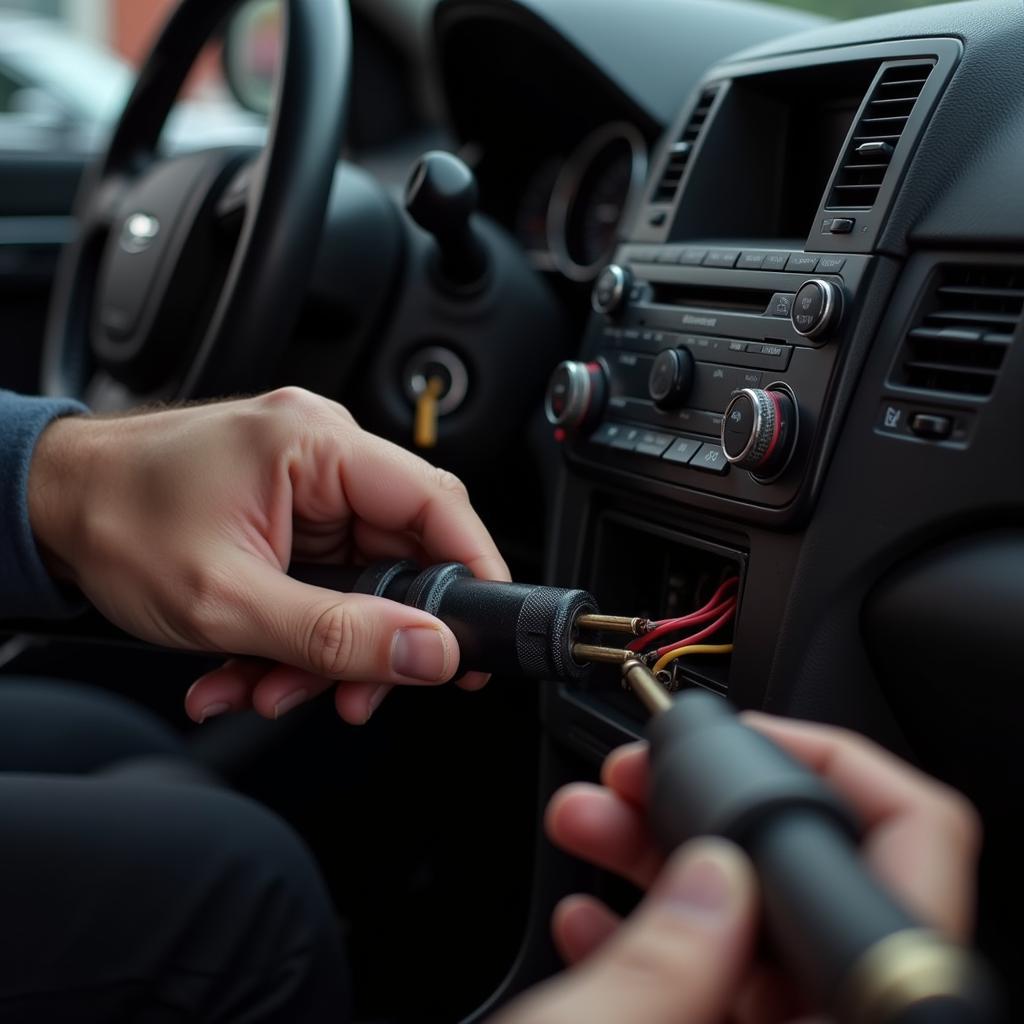Modern vehicles are increasingly reliant on complex electrical systems. Understanding these systems and having the right Electrical Tools For Cars is crucial for both professionals and DIY enthusiasts. This guide will explore the essential tools you need to diagnose and repair automotive electrical issues effectively.
Understanding Your Car’s Electrical System
Before diving into the tools, it’s helpful to understand the basics of your car’s electrical system. This intricate network powers everything from the headlights to the engine control unit (ECU). Common components include the battery, alternator, starter, wiring harnesses, fuses, relays, and various sensors. Problems within this system can manifest in many ways, from a dim headlight to a complete engine failure. That’s why having the right electrical diagnostic tools for cars is so important.
Why Are Electrical Tools Important?
Electrical issues can be tricky to pinpoint without the proper tools. A simple guess can lead to replacing perfectly good components, costing you time and money. Investing in quality tools you should own for a car allows you to accurately diagnose the problem, saving you headaches down the road.
Must-Have Electrical Tools for Cars
This section details the essential tools every car owner or mechanic should have.
Multimeter
A multimeter is arguably the most important electrical tool. It measures voltage, current, and resistance, allowing you to pinpoint shorts, open circuits, and other electrical faults. Choose a multimeter with automotive-specific features like diode testing and frequency measurement.
Test Light
A test light is a simple yet effective tool for checking if a circuit is live. It’s especially useful for diagnosing issues with fuses, relays, and power wires.
Wire Strippers/Crimpers
These tools are essential for working with wiring. Wire strippers remove insulation without damaging the wire, while crimpers create secure connections for terminals and connectors.
Soldering Iron and Heat Shrink Tubing
For more permanent repairs, a soldering iron and heat shrink tubing are invaluable. Soldering creates strong, reliable electrical connections, while heat shrink tubing provides insulation and protection.
 Car Electrical Repair Tool Kit
Car Electrical Repair Tool Kit
Automotive Connectors and Terminals
Having a variety of connectors and terminals on hand is essential for repairing damaged wiring or adding new electrical accessories.
Diagnostic Scanner
While more advanced, a diagnostic scanner allows you to read and interpret trouble codes from the vehicle’s ECU, providing valuable insights into electrical system problems. It’s particularly useful for diagnosing issues with sensors and other electronic components. Choosing the right car electrical repair tools can make all the difference.
What are some basic electrical tools for cars?
Some basic electrical tools for cars include a multimeter, test light, wire strippers/crimpers, and a soldering iron.
What is the most important tool for car electrical work?
The multimeter is arguably the most important tool for car electrical work due to its versatility in diagnosing various electrical faults.
What tools do I need for simple car electrical repairs?
For simple car electrical repairs, you’ll likely need a multimeter, test light, and wire strippers/crimpers.
“A quality multimeter is your best friend when it comes to car electrical diagnostics. It’s the foundation of any electrical toolkit,” says John Smith, ASE Certified Master Technician.
Conclusion
Having the right electrical tools for cars empowers you to tackle electrical issues effectively, saving you time and money. From simple tests to more complex repairs, investing in quality names of tools for cars is essential for any car owner or mechanic. Remember, a well-equipped toolkit is a key to a smooth and reliable driving experience.
FAQ
- What are some common car electrical problems? Common issues include faulty batteries, alternators, starters, fuses, relays, and wiring problems.
- How do I know if my car has an electrical problem? Signs can include dimming headlights, flickering interior lights, a clicking starter, or a dead battery.
- Can I fix car electrical problems myself? Some simple repairs can be done DIY, but more complex issues require professional assistance.
- What safety precautions should I take when working with car electrics? Always disconnect the battery before working on any electrical components.
- How often should I check my car’s electrical system? It’s good practice to have your electrical system checked during regular maintenance services.
Other Questions You Might Have
- What car home mechanic tools should I have?
- How to use a multimeter for car diagnostics?
- Where can I find reliable car electrical repair guides?
For further assistance, please contact us via WhatsApp: +1(641)206-8880, Email: [email protected] or visit us at 910 Cedar Lane, Chicago, IL 60605, USA. Our customer service team is available 24/7.

Leave a Reply